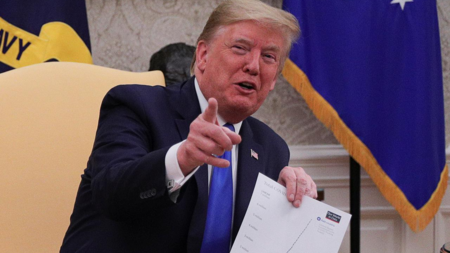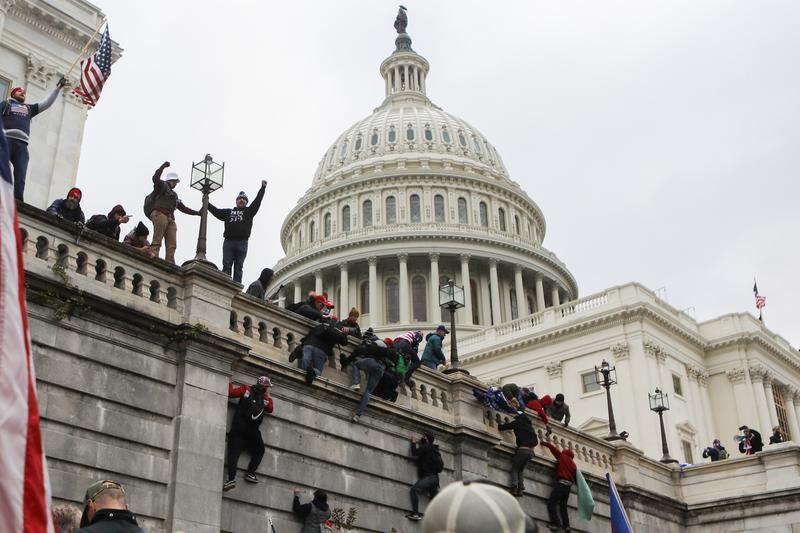
Editor's note: Andrew Korybko is a Moscow-based American political analyst. The article reflects the author's opinions and not necessarily those of CGTN.
It was recently revealed by The New York Times that the former Donald Trump administration's Department of Justice (DOJ) subpoenaed a plethora of records about two leading Democrat members of the House Intelligence Committee, Representatives Adam Schiff and Eric Swalwell, as part of its investigation into the leaking of classified information. Many more people were caught up in this digital dragnet, including some of their family members and staff, after the DOJ successfully received their metadata from Apple. This startling revelation has raised plenty of questions about the Trump era.
Everyone remembers the nearly incessant leaks that dripped out of the U.S. government at the time about practically every issue of interest, including those pertaining to now-debunked conspiracy theories like the false claim that the former President was secretly a Russian puppet. On the one hand, some can argue that those disclosures (whether ultimately proven true, false, or still factually inconclusive) were a service to the American people by allowing them to obtain a better understanding of their elected government's activities. On the other, however, it can just as plausibly be claimed that these leaks constituted a national security threat.
Schiff and Swalwell were among Trump's most vociferous critics, which makes the government's investigation into them highly controversial since it suggests that it might have been driven more by political motivations than legitimate ones related to national security concerns. The outcome of those investigations could have also revealed scandalous information unrelated to the official purpose for searching through their digital records, which could in turn have made them susceptible to blackmail if such knowledge was exploited for that end. That doesn't seem to have happened, but that very scenario still worries many Americans.
The opposite side of the debate asserts that those politicians' practical hatred for the former President might have inspired them to leak confidential information that they could have come across as part of their duties for purely partisan reasons, hence what might have been the government's legitimate interest in investigating them just to make sure that nothing of the sort transpired. Both arguments are compelling in their own way, though the American people might never receive closure considering the confidential nature of these contentious investigations. Even so, some important conclusions can still be made about this scandal.

Supporters of Donald Trump climb on walls at the U.S. Capitol during a protest against the certification of the 2020 U.S. presidential election results by the U.S. Congress, in Washington, D.C., U.S., January 6, 2021. /Reuters
Supporters of Donald Trump climb on walls at the U.S. Capitol during a protest against the certification of the 2020 U.S. presidential election results by the U.S. Congress, in Washington, D.C., U.S., January 6, 2021. /Reuters
The first is that the Trump era was unquestionably defined by intense political warfare between Democrats and Republicans which became so serious that the DOJ officially had reason to believe that some of the former's leading Representatives might have endangered national security after getting carried away with their partisan crusade against then President. Secondly, there's no denying that the optics of a Republican DOJ investigating prominent opposition members carries with it the concern that Trump might have abused his Presidency for similarly partisan reasons as some of his opponents were speculated to have done.
Building upon these observations, it can be said that the U.S. was in the midst of an undeclared political civil war between its elites which might have seen one, the other, or perhaps even both sides immorally – if not illegally – exploiting their elected positions for the purpose of discrediting the other. It's also unclear whether this political civil war has even ended or if the Joe Biden administration, whether on the President's prerogative or at the initiative of some of his most zealous supporters in the government, simply replaced its predecessor's role in possibly wielding the DOJ as a weapon against its opponents though this time related to the January 6 Capitol riot.
There are countless questions but regrettably no answers at this time, but all that this serves to show is how dysfunctional American democracy has become over the past four years. Whether it's the accusations of opposition members endangering national security by leaking classified information and/or the former administration sacking the DOJ on its opponents for political reasons, there's no denying that American democracy seriously started coming apart at the seams during the Trump era. It's therefore little wonder that America's soft power declined across the world during this time since less societies want to emulate its model.
(If you want to contribute and have specific expertise, please contact us at opinions@cgtn.com.)

